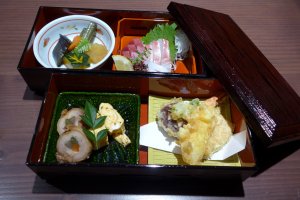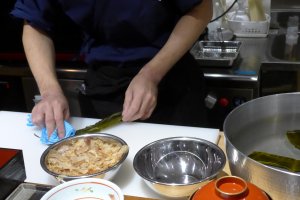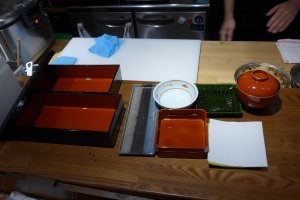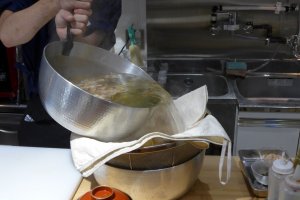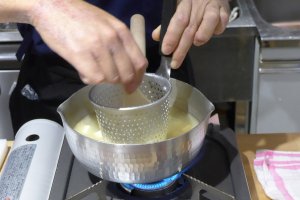“Let’s enjoy cooking!” This is what my teacher for the day, a professional chef, said numerous times during my Washoku (Japanese cuisine) cooking class. And enjoy it I did.
The lesson at Chagohan in Asakusa was a good mixture of demonstration, information, interaction, and of course, fresh ingredients cooked and presented wonderfully. I attended the shokado bento dinner class where I learnt how to make many dishes, including sushi, tempura, miso soup and dashimaki. There are other cooking and tea appreciation classes in the day time. They are open for dinner as a restaurant as well, but like the classes, you have to make a booking online at least two hours in advance. There isn’t a lot of space, so it is best to book as early as possible.
The classes can be conducted completely in English, and you will be provided with an apron and a full set of instructions and information on what is covered during the lesson. The chef’s assistant will help to explain everything in detail, while the in-house chef demonstrates. It was a really eye-opening experience and made me appreciate where my food came from even more; it brought a whole new meaning to the terms itadakimasu and gochisousama.
First you are taught how to make the dashi broth, where you learn how kelp is prepared, and how bonito flakes are produced. Next the chef demonstrates how to make sushi rice and form nigiri, make miso soup, dashimaki, a rolled egg omelette, fry tempura, and slice sashimi. Watch closely, as you will have to attempt to recreate it later on.
Presentation is an important part of the meal, and the chef delicately arranges the tempura, sushi, sashimi and simmered vegetables on plates and in bowls. It already looks so good that I can’t wait to start eating. For the final step, the dishes are all arranged nicely into bento boxes, reflecting traditional presentation of shokado bentos.
But before you can eat, you have to cook those mouthwatering dishes for yourself. You will not get to make all the dishes, but the arrangement of all of them is up to you. It was my first time cooking omelette in a rectangular frying pan, and I resorted to using a spatula instead of chopsticks, like most Japanese chefs. Making the sushi was particularly challenging but all the more fun. Handling the long narrow knife to slice sashimi was also a new experience. For plating, you can get creative with your own arrangement, or you can test your skills and patience by trying to follow the chef’s example as closely as possible.
After a quick inspection by the chef you will be free to enjoy your creation with a cup of tea and small dessert. Thanks to the fresh and well-made base ingredients, the meal tasted great despite my amateur skills. The class can take a maximum of ten students at a time and it is a fun activity to do with family and friends.
Not only is the content of the class itself interesting, the chef and assistant are lively and friendly, keeping the class really engaging and fun. I highly recommend this place for a fun and delicious introduction to Japanese cooking, for both the novice and experienced alike.


